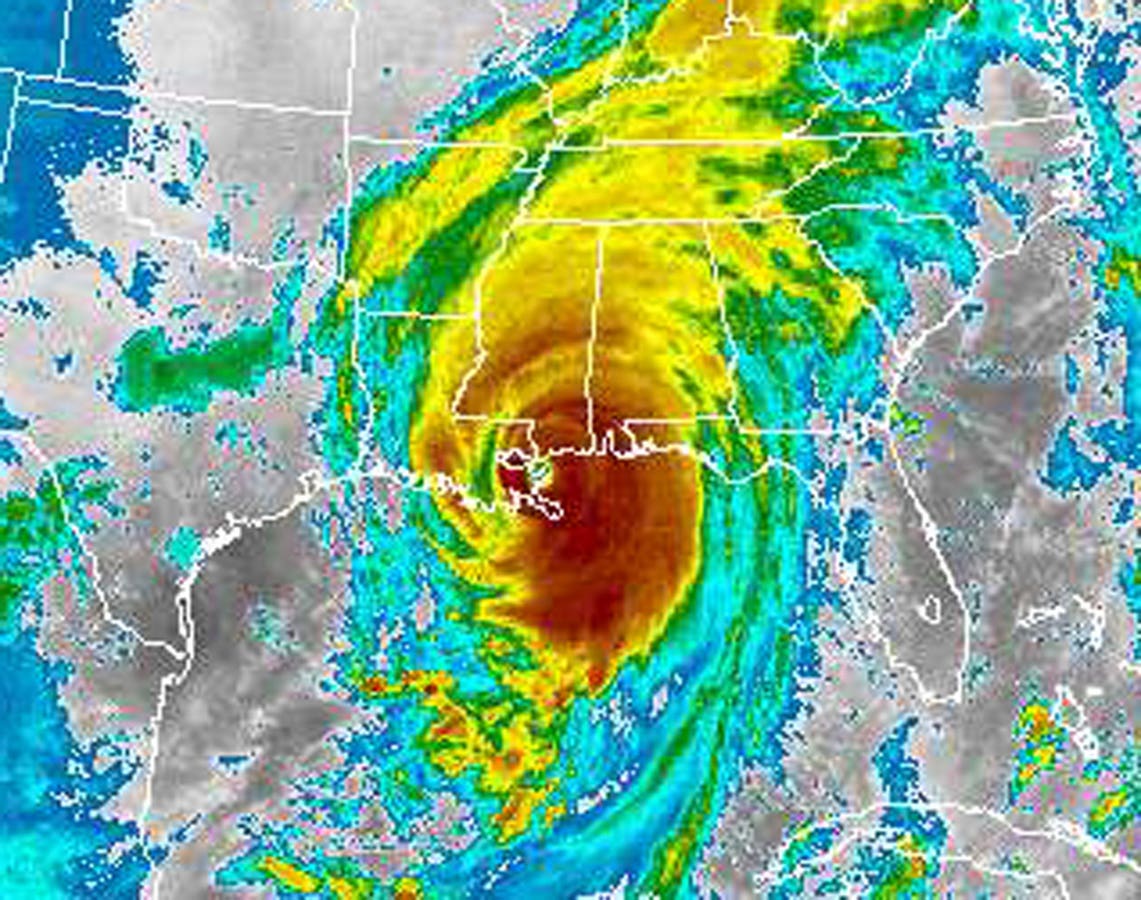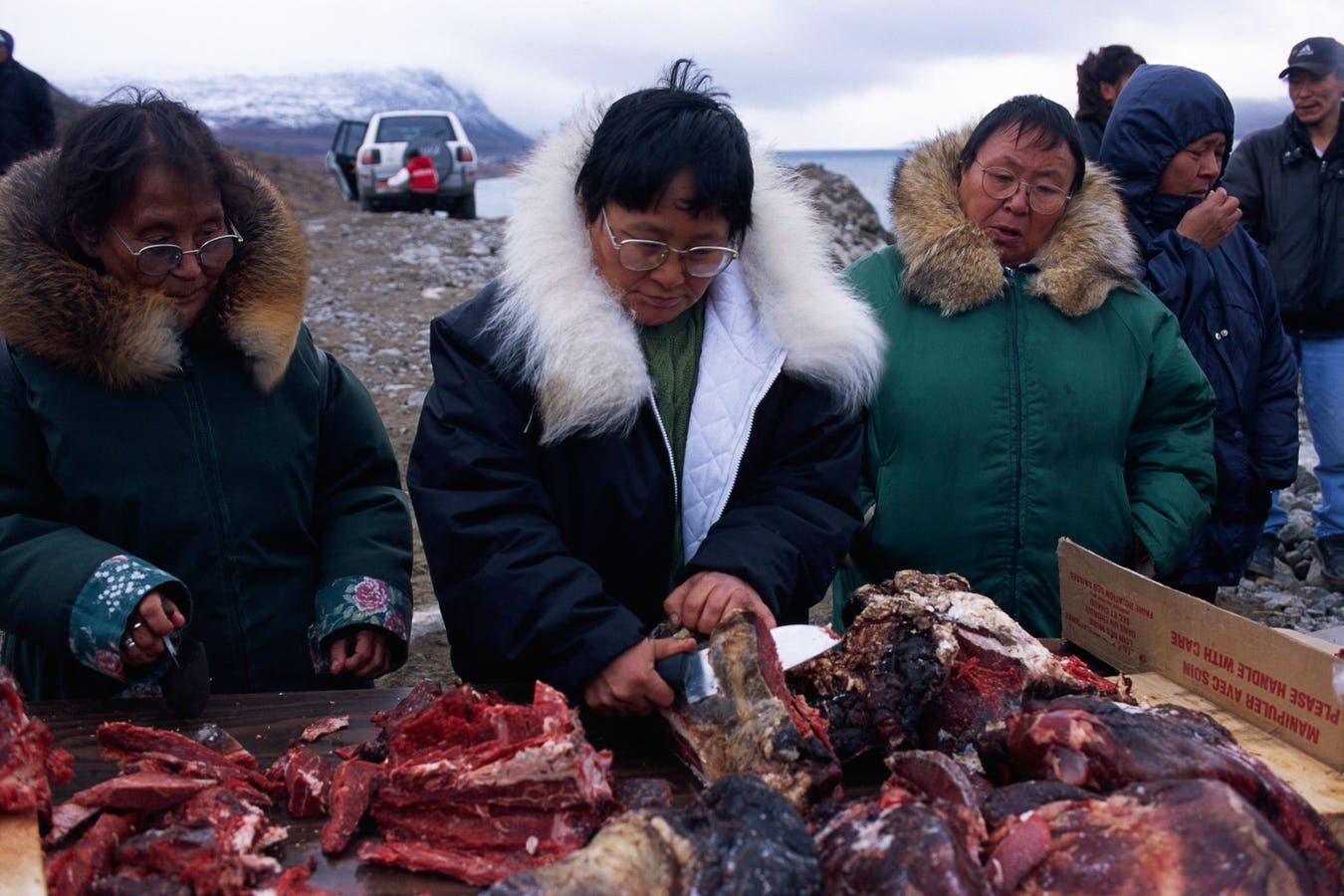IN SPACE – AUGUST 29: In this color enhanced satellite image from NOAA, Hurricane Katrina is seen August 29, 2005 over southeastern Louisiana. Katrina made landfall with sustained winds at 140 MPH. (Photo by NOAA via Getty Images)
Getty Images
The most valuable words I ever heard about leadership were provided by retired Coast Guard Admiral Thad Allen, whom I met in 2010 at RAND’s Washington, D.C., offices. He’s best known for bringing order to the initially chaotic federal response to Hurricane Katrina. His insights bear repeating today.
Katrina Struck Twenty Years Ago
Hurricane Katrina made landfall on the Louisiana coast at roughly 6:00 am on Aug 29, 2005. At 8:30 that morning, FEMA’s regional office in New Orleans received a report that “a twenty-foot tidal surge… came up and breached the levee system in the canal.” Soon thereafter, multiple levees and floodwalls failed. The following morning, a Department of Homeland Security situation report stated: “Much of downtown and east New Orleans is underwater, depth unknown at this time… Widespread and significant flooding has occurred throughout the city.”
Local and state officials were overwhelmed by the scale of the disaster. So was the Federal Emergency Management Agency, led at the time by Michael D. Brown, a political appointee with no background in disaster management.
Heart-wrenching images and stories from New Orleans and other Gulf Coast communities shocked the American public. On September 5, DHS Secretary Michael Chertoff named Admiral Thad Allen, then the Coast Guard Chief of Staff, to lead the Katrina search-and-rescue efforts. Four days later, Chertoff relieved Michael Brown and directed Admiral Allen to lead the relief effort.
A Pivotal Moment In The Response
Allen faced a nearly insurmountable challenge. Cognizant that officials and volunteers were exhausted and discouraged, he immediately took action to focus their efforts.
The story he told me is summarized here:
“I asked [them] to assemble as many [volunteers and other relief personnel] as we could in one location so I could talk to them. We got about [2,000 people] in a big, open space, and I got up on a desk with a loudhailer … I explained I was giving them a firm, direct order. ‘You’re to treat anyone you come in contact with that’s been affected by this storm as if they were a member of your own family, as if they were your brother, mother, father or sister … If you really do that, and you make a mistake, you will have erred on the side of doing too much, and that’s okay. Also, if somebody has a problem with what you did, their problem is not with you, it’s with me, because I gave you the order.”
He recalled their reaction:
“There were people in the room who were openly weeping, and there were collective sighs. Nobody had ever told the workforce in very simple terms what was important, what the priorities were, that leadership cared about them and their mission, and that leadership was there to back them.”
A Case Study in Leadership
Admiral Allen provided the thousands of local, state and federal officials and volunteers involved in the Katrina response with a framework to guide their actions. He empowered them to do the right thing and get people the help they needed. By promising his team that he’d back them up, he gave them the courage to make decisions without second-guessing their actions or fearing that they’d get in trouble.
Admiral Allen also worked seamlessly with General Russell Honoré, commander of the joint military force assigned to provide manpower, vehicles and logistical support to the relief effort. To many Americans, Honoré was the face and voice of the federal response, but Allen did not mind. The two consulted with each other 20-40 times each day.
After staying to lead the response to Hurricane Rita a month later, Admiral Allen returned to his Coast Guard duties. In May 2006, he became Commandant of the U.S. Coast Guard, a position he held until May 2010. The month before he stepped down, DHS Secretary Janet Napolitano named him National Incident Commander for the Deepwater Horizon oil spill.
General Honoré retired from military service in 2008. Since then, he’s been a vocal advocate for improving U.S. disaster preparedness. In 2021, he led a review of security at the U.S. Capitol following the January 6 attack.
UNITED STATES – AUGUST 30: Neighborhoods in New Orleans are completely flooded in the aftermath of Hurricane Katrina. (Photo by Michael Appleton/NY Daily News Archive via Getty Images)
NY Daily News via Getty Images
Post-Katrina Reforms
Three weeks after the storm, President George W. Bush acknowledged in a speech in New Orleans that “The system, at every level of government, was not well-coordinated and was overwhelmed in the first few days.” In 2006, Congress acted to strengthen and expand FEMA. The agency was given more funding and greater authority to respond quickly to major disasters. Congress also required that FEMA’s leader be a disaster response expert.
Current Federal Leadership Is Choosing A Different Path
Since Hurricane Katrina, more than $14 billion has been spent to upgrade New Orleans’ flood protection system. Unfortunately, recent government actions are undermining this work, according to Scientific American. Parts of the rebuilt flood wall are already weakening and federal funds to inspect it cut. Additionally, President Trump is undoing reforms Congress implemented in the aftermath of the storm. His administration has cut billions of dollars from disaster preparedness and assistance programs. FEMA’s acting head, David Richardson, has no background in disaster management. In June, Trump said that he intends to phase out FEMA following the hurricane season, according to CNN.
On August 25, more than 190 current and former FEMA employees sent a signed letter to Congress warning that the administration is undermining the agency’s readiness to respond to large-scale disasters. Two days later, DHS placed the employees who signed the letter on administrative leave, according to Fox News. That’s a far cry from the inspiring message Admiral Allen delivered to his team when he assumed command of the Katrina response.
Climate change is intensifying storms and making rainfall heavier. Sooner or later, America will face another disaster on the scale of Hurricane Katrina. When it happens, as it surely will, our government may not be up to the task.
From 2010 to 2013 Dr. Kellermann held the Paul O’Neill Alcoa Chair in Policy Analysis at RAND. His views are his own, and do not neccessarily reflect those of RAND or any other prior or current employer.









